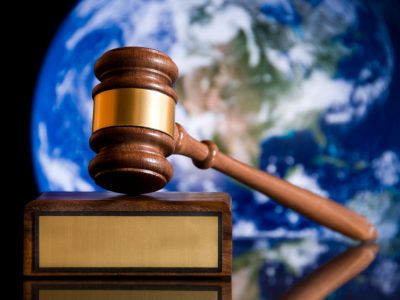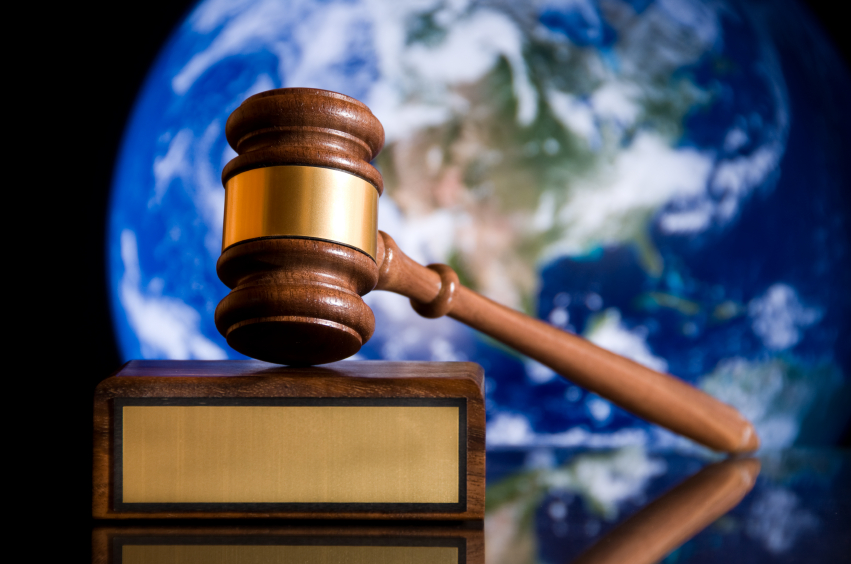

As recent extreme heat waves, hurricanes, and wildfires across the country have elevated public concern about the widespread and harmful effects of climate change, the U.S. Supreme Court granted certiorari this month in a climate liability case called BP P.L.C. v. Mayor and City Council of Baltimore. In short, the City of Baltimore sued a variety of oil companies, seeking damages under Maryland state public nuisance law for the oil companies’ contributions to climate change. Baltimore alleges that the oil companies knew about the harmful effects of climate change and undertook a campaign to conceal that knowledge and simultaneously discredit scientific understanding about it.
Baltimore, like many other local and state governments in recent years, filed its case under state law, in a state court—as is typical for public nuisance claims. Indeed, this summer featured a wave of similar state court lawsuits filed against oil companies by the states of Minnesota, Delaware, and Connecticut, as well as Washington D.C., Hoboken, New Jersey, and Charleston, South Carolina.
The nuanced issue presented before the Supreme Court is a complex question of civil procedure, about the conditions under which defendants (such as oil companies) appeal a federal district court’s decision to “remand” a case, or send it back to state court, after the defendants have attempted to remove it to federal court. The oil companies are seeking a ruling that would create a pronounced loophole, where a simple procedural trick would allow for appellate review of a district court’s reasons for remanding the case—reasons that Congress expressly made unreviewable. A ruling in favor of the oil companies could force plaintiffs in a wide variety of cases bringing claims under state law—especially environmental plaintiffs—to undergo lengthy federal appellate review before even obtaining discovery in state court, contrary to Congress’s intent.
Below I provide brief summary of the legal context in which this case arises and the potential implications of the case.
Removal
When a plaintiff wishes to bring a lawsuit against a defendant in state court, the defendant ordinarily has the right to “remove” the case to federal district court. Defendants typically prefer to be in federal court than in state court, for a variety of reasons such as more restricted discovery of documents and information under the Federal Rules of Civil Procedure, more favorable treatment from federal juries, and—relevant to environmental plaintiffs—federal standing requirements. A defendant’s ability to remove a case is established by federal statutes, where Congress has identified the types of cases that can be removed, and the procedures that the defendant must follow to remove the case.
But no matter what, defendants may remove only those cases which could have originally been brought in federal court. Otherwise, the federal court would not have subject-matter jurisdiction over the case, as required under Article III, Section 2 of the U.S. Constitution for the case to go forward.[1]
Aside from the two main categories of original federal jurisdiction—“federal question” and “diversity” jurisdiction—Congress has also created additional statutory bases for defendants to remove cases to federal court. One of those reasons for removal is codified in 28 U.S.C. § 1442, which allows a defendant to remove an action filed in state court if the action “is against or directed to” the following:
The United States or any agency thereof or any officer (or any person acting under that officer) of the United States or of any agency thereof, in an official or individual capacity, for or relating to any act under color of such office . . .
In other words, if a plaintiff sues a federal officer or agency, then Congress has authorized those cases to be heard in federal court. This is commonly referred to as federal-officer removal.
Appeals of Removal Orders
After a defendant removes a case to federal district court, the plaintiff may file a motion to remand the case back to state court, presenting the opportunity to convince the federal court that the case actually does not satisfy federal subject-matter jurisdiction or any of the bases for removal established by Congress.
Congress has long established that a federal court’s order remanding a case back to state court ordinarily cannot be appealed. Thus, if a court grants the plaintiff’s motion to remand, the defendant that attempted to remove the case would have no choice but to proceed forward in litigating the plaintiff’s claims in state court. This is consistent with a general principle of federal civil procedure where appeals can be made only after a court issues a final judgment in the case, except in certain unusual circumstances. This principle serves to ensure that cases aren’t delayed, and the federal appeals courts clogged, by endless appeals of numerous pre-judgment decisions.
However, Congress also included two specific exceptions to the inability to appeal a district court’s remand order: (1) federal-officer removal under 28 U.S.C. § 1442 (which Congress made appealable in the Removal Clarification Act of 2011), or (2) certain civil rights cases that can be removed under 28 U.S.C. § 1443. The specific statutory language is as follows:
An order remanding a case to the State court from which it was removed is not reviewable on appeal or otherwise, except that an order remanding a case to the State court from which it was removed pursuant to section 1442 or 1443 of this title shall be reviewable by appeal or otherwise.
28 U.S.C § 1447(d). So, if the federal district court remands a removed case back to state court, and the initial removal was premised upon claims “against or directed to” federal officers or agencies under § 1442, then the defendant can file an appeal and have the applicable Court of Appeals review whether the removal on that basis was proper.
Removal of Climate Liability Cases
In the Baltimore case, Baltimore brought a lawsuit against oil companies, asserting that the companies made coordinated efforts to conceal their knowledge about the negative impacts of climate change (to which their fossil fuel production activities contributed) from the public. In that case, and in other similar climate liability cases filed by cities or states in other state courts, the oil companies removed the plaintiffs’ claims to federal court, relying on the federal-officer removal under 28 U.S.C. § 1442 as one of the bases for removing the case (based on the argument that the companies were acting as federal officers in their relevant conduct). But they also cited numerous other reasons for removal as well, which typically would not be appealable after remand.
When each of these cases was removed to federal court, the plaintiffs filed a motion to remand their claims back to state court, challenging the reasons that the oil companies cited to remove the case (including federal-officer removal). In some cases, the district courts denied the motion to remand and kept the case in federal court, only to dismiss the plaintiffs’ claims. In other cases, the district courts granted the plaintiffs’ motions to remand and sent the case back to state court.
On appeal of the remanded cases, the oil companies argued that the appellate court had the ability to review not only whether removal was proper under federal-officer removal, but also whether the case was properly removable and should remain in federal court for the other reasons the oil companies advanced.
In the Baltimore case, the Fourth Circuit held that only the federal-officer removal was reviewable on appeal and declined to review the other asserted reasons for federal jurisdiction. (In a prior post, my colleague Ann Carlson covered the Fourth Circuit’s decision to deny a stay in the Baltimore case and allow the state law case to proceed forward with discovery during the pendency of the Fourth Circuit’s review.) In fact, all of the Court of Appeals panels hearing these climate liability cases so far have concluded that the cases belong in state court and must be remanded.[2]
However, it appears to be somewhat of an unsettled question, subject to a split among circuit courts, as to whether other bases for removal are reviewable on appeal if the defendant includes federal-officer removal. In the climate liability appeals, the Court of Appeals panels did not review the other bases for removal aside from federal-officer removal. But at least one other appellate court—the Seventh Circuit—had previously concluded the opposite and found the other grounds for removal to be reviewable as well.
Supreme Court Review
By agreeing to hear the Baltimore case, the Supreme Court has stepped in to settle the question whether other removal grounds can be reviewed on appeal alongside federal-officer removal under § 1442. It is not clear how the Court will decide the case, but the conservative makeup of the Court suggests the possibility of a decision that would benefit corporations, by allowing defendants to obtain appellate review of the entirety of a remand order—even grounds for removal that would ordinarily not be appealable in the first place.
This kind of procedural bootstrapping may seem to be relatively unimportant, but the consequences could be severe. Allowing appellate review of these other removal grounds would effectively overwrite Congress’s express limitation of appealable remand orders, allowing defendants to circumvent the lack of appellate review simply through procedural tricks when removing a case to federal court. Regardless of whether any defendant might be successful on appeal of the traditionally non-reviewable grounds for removal, the mere possibility that defendants could obtain appellate review of the other grounds for removal would create perverse incentivizes for all types of defendants. As Baltimore argued in opposing certiorari to the Supreme Court:
Petitioners’ proposed construction—which focuses exclusively on the word “order”—would make every issue addressed in a remand order reviewable so long as either Section 1442 or Section 1443 were included among the jurisdictional grounds for removal, thus enabling the exception to swallow the rule and encouraging meritless assertions of civil-rights or federal-officer jurisdiction as a device to obtain appellate review of otherwise non-reviewable jurisdictional grounds for removal.
If the Supreme Court were to agree with the oil companies, defendants in future removals could also include frivolous federal-officer grounds for removal in order to delay the plaintiff’s case for up to several years by forcing additional appellate review. These appeals also would be heard before any discovery could be obtained, imposing substantial early litigation costs on plaintiffs (which may be particularly challenging for many environmental plaintiffs to incur). As a result, plaintiffs in a variety of cases could be deterred from filing a lawsuit at all simply because of the specter of a round of appellate review about the proper jurisdiction for the case, before any activity on the merits of the case.
The oil companies’ argument in the Baltimore case for federal-officer jurisdiction is a prime example of how this reviewable basis for removal could be misused to allow for appellate review of conventional (and unappealable) removal grounds. Across all of these climate liability cases, the oil companies argued that removal was proper under § 1442 due to the following contractual relationships between some oil companies and the federal government: (1) fuel supply agreements with the Navy Exchange Service Command; (2) oil and gas leases administered and overseen by the Department of Interior; and (3) a specific 1944 unit agreement between the Navy and an oil company to jointly operate a single petroleum reserve in California.
This reasoning is not at all what was intended by actions “against or directed to” federal agencies under § 1442. Unsurprisingly, the Fourth Circuit found that these contractual relationships are insufficient to show that the oil companies “acted under” a federal officer and carried out their oil and gas activities in relation to the federal agencies’ official authority. As Baltimore asserted in opposing certiorari to the Supreme Court, it seems clear that the only reason the oil companies added this basis for removal was to preserve their right to seek an appeal of their other bases for removal in response to a district court’s decision to remand the case to state court.
Final Thoughts
Ultimately, if the Supreme Court allows for this loophole that authorizes appellate review of otherwise unreviewable grounds for removal, there likely will be a substantial logjam of cases in federal courts. Appellate courts would be frequently asked to determine whether federal jurisdiction exists under all of the stated grounds for removal, adding a vast number of cases to the appellate docket.
As a former judicial clerk for a federal district judge, I can say with confidence that most federal district judges would not welcome an expansion of their docket to include a variety of appealable removals predicated on frivolous arguments for federal-officer jurisdiction. And certainly the same would be true for appellate court judges, who already face substantial caseloads and long timelines for deciding appeals.
If the Supreme Court does side with the oil companies, Congress may need to amend the removal statutes to include a mechanism that prevents defendants from abusing this loophole. At stake is the availability of state court forums for a variety of state law claims, not just for environmental plaintiffs but also for a wide variety of other aggrieved parties seeking to assert their rights in state court.
(As a disclaimer, the Frank G. Wells Environmental Law Clinic at UCLA School of Law has worked with plaintiffs’ counsel in the referenced climate liability cases. As with all Legal Planet posts, the views and arguments in this post are my own and not attributable to the Clinic, UCLA, or any other Legal Planet contributor.)
[1] Congress reaffirmed and codified this jurisdictional requirement in 28 U.S.C. § 1441(a).
[2] Other recent appellate cases rejecting the oil companies’ federal-officer removal argument include the Ninth Circuit’s opinion in County of San Mateo v. Chevron Corp. and the Tenth Circuit’s opinion in Board of County Commissioners of Boulder County v. Suncor Energy (U.S.A.) Inc.
The post Removing Climate Liability Plaintiffs from State Court Could Create Logjam in Federal Courts appeared first on Legal Planet.
By: Benjamin Harris
Title: Removing Climate Liability Plaintiffs from State Court Could Create Logjam in Federal Courts
Sourced From: legal-planet.org/2020/10/12/removing-climate-liability-plaintiffs-from-state-court-could-create-logjam-in-federal-courts/
Published Date: Mon, 12 Oct 2020 13:55:51 +0000
Vist Maida on Social Me
Website Links
Maida Law Firm - Auto Accident Attorneys of Houston, by fuseology

No comments:
Post a Comment